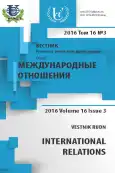Security Theories of Third World
- Authors: Khudaykulova A.V.1
-
Affiliations:
- MGIMO-University
- Issue: Vol 16, No 3 (2016): International Conflicts: Quo Vadis?
- Pages: 412-425
- Section: ARTICLES
- URL: https://journals.rcsi.science/2313-0660/article/view/339008
- ID: 339008
Cite item
Abstract
This article analyzes the security studies in the “Third World”. The evolution of the conceptual apparatus in the field of security studies and in the understanding of the “Third World” is given. The author provides us an analysis of the security issues in the so-called “post-colonial” countries in the years of “cold war” and in the post-bipolar period, defines the domain of security for the developing world and the current agenda. Particular attention is paid to the analysis of the security concepts of the late XX century - the “security of the person”, “securitization”, “humanitarian intervention” - which are of particular concern to countries of the “Third World”. An alternative format of the “Third World” in the categories of postmodern, modern and premodern worlds is given, the term of “non-Westphalian” state is used as well. Basic characteristics of the “Third World” in the socio-economic and political spheres are provided. The author emphasizes that the state of security of the “Third World” is fundamentally different from that of the developed Western countries, since most threats in non-Western countries, does not come from the outside, but from within. Accordingly, the non-Western security theory does not focus exclusively on military issues and explore a wide range of issues of civil nature - economic, political, social, environmental and development challenges, as well as poverty and underdevelopment.
About the authors
Alexandra Victorovna Khudaykulova
MGIMO-University
Author for correspondence.
Email: khudaykulova@mgimo.ru
MFA of Russia
References
- Acharya, A. (2011). Norm Subsidiarity and Regional Orders: Sovereignty, Regionalism, and Rule-Making in the Third World. International Studies Quarterly, 55 (1), pp. 95-123.
- Acharya, A. (1997). The Periphery as the Core: The Third World and Security Studies in Critical Security Studies: Concepts and Cases. Ed. by Keith K., Williams M. London: UCL Press.
- Al-Mashat, A.-M. (1985). National Security in the Third World. Boulder: Westview Press.
- Ayoob, M. (1991). The Security Problematique of the Third World. World Politics, 43(2), pp. 257-283.
- Ayoob, M. (1995). The Third World Security Predicament: State Making, Regional Conflict and the International System. Boulder: Lynne Rienner.
- Ayoob, M. (2002). Humanitarian Intervention and State Sovereignty. The International Journal of Human Rights, 6 (1), pp. 81-102.
- Azar, E., Moon, C. (1988). National Security in the Third World: The Management of Internal and External Threats. Aldershot: Edward Elgar.
- Barkawi, T., Laffey, M. (2006). The postcolonial moment in security studies // Review of International Studies, 32 (02), pp. 329-352.
- Braveboy-Wagner, J. (1986). Interpreting the Third World: Politics, Economics, and Social Issues. N.Y.: Praeger.
- Buzan, B. (1991). People, States and Fear. An agenda for international security studies in the post-cold war era. N.Y.: Harvester Wheatsheaf.
- Buzan, B., Little R. (2000). International Systems in World History: Remaking the Study of International Relations. Oxford: Oxford University Press.
- Fawcett, L. (2005). Regionalism from an Historical Perspective in The Global Politics of Regionalism. Ed. by Farrell M., Hettne B., Van Langenhove L. London, Pluto Press.
- Holsti, K. (1996). The State, War, and the State of War. Cambridge: Cambridge University Press.
- Khudaykulova, A.V. (2010). «Bezopasnosti lichnosti»: kontseptsiya, politicheskii diskurs i vozmozhnosti prakticheskogo primeneniya [Human Security: the concept of political discourse and the practical application]. Vestnik MGIMO Universiteta, 6, pp.175-180.
- Krasner, S. (1985). Structural Conflict: The Third World against Global Liberalism. Berkeley: University of California Press.
- Kremenyuk, V.A. (2003). Sovremennyi mezhdunarodnyi konflikt: problemy upravleniya [Modern international conflict: management problems]. International Trends. №1. P.63-73.
- Kulagin, V.M. (2012). Sovremennaya mezhdunarodnaya bezopasnost' [Modern international security]. Moscow: Knorus.
- Labyuk, O. (2008). «Otvetstvennost' po zashchite» i pravo na vmeshatel'stvo ["Responsibility to protect" and the Right to intervene]. International Trends, 3, pp. 59-66.
- MacFaflane, N. (1985). The Soviet Conception of Regional Security. World Politics, 37 (03), pp. 295-316.
- Mazrui, A. (1977). Africa's International Relations: The Diplomacy of Dependency and Change. Boulder: Westview Press.
- Mortimer, R. (1984). The Third World Coalition in International Politics. 2d ed. Boulder: Westview Press.
- Nacht, M. (1981). Toward an American Conception of Regional Security. Daedalus, 110 (01), pp. 1-22.
- Nikitin, A.I. (2006). Mezhdunarodnye konflikty i ikh uregulirovanie [International conflicts and the settlement]. Mirovaya ekonomika i mezhdunarodnye otnosheniya, 2, pp. 3-16.
- Rothstein, R. (1977). The Weak in the World of the Strong: The Developing Countries in the International System. N.Y.: Columbia University Press.
- Security Policies of Developing Countries. (1982). Ed. by Kolodziej E., Harkavy R. Lexington: Lexington Books.
- Thomas, C. (1987). In Search of Security: The Third World in International Relations. Brighton: Harvester Wheatsheaf.
- Thomas, R. (2003). What is Third World Security? Annual Review of Political Science, 6, pp. 205-232.
- Zakaria, F. (2009). The Post-American World. NY: W. W. Norton & Company.
Supplementary files









